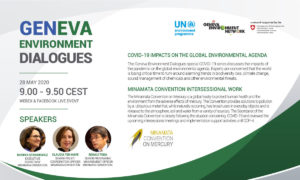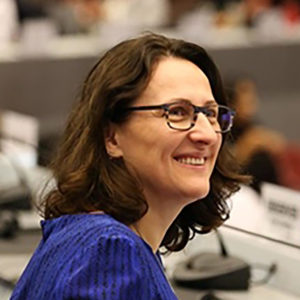Événement Virtuel
GENeva Environment Dialogues | Minamata Convention Intersessional Work

The Minamata Convention on Mercury is a global treaty to protect human health and the environment from the adverse effects of mercury. The Convention provides solutions to pollution by a global and ubiquitous metal that, while naturally occurring, has broad uses in everyday objects and is released to the atmosphere, soil and water from a variety of sources. The Secretariat of the Minamata Convention is closely following the situation concerning COVID-19 and reviewed the upcoming intersessional meetings and implementation support activities until COP-4.
About the GENeva Environment Dialogues
The GENeva Environment Dialogues’ special COVID-19 series discusses the impacts of the pandemic on the global environmental agenda. Experts are concerned that the world is losing critical time to turn around alarming trends in biodiversity loss, climate change, sound management of chemicals and other environmental threats.
The series addresses the following topics:
- The impact of the crisis on the invited organization activities
- The response of the invited organization to the COVID-19 crisis
- The impacts on the preparations of the conferences and negotiations they are hosting
- New schedules and programmes for these conferences and negotiations
Speakers
Facilitators: GEN Team

Monika STANKIEWICZ
Executive Secretary, Minamata Convention on Mercury

Claudia TEN HAVE
Senior Policy Coordination Officer, Minamata Convention on Mercury

Eisaku TODA
Senior Programme Management Officer, Minamata Convention on Mercury
Summary
Welcome
Moderation: Diana Rizzolio, Geneva Environment Network
The COVID-19 pandemic is a health crisis that affects everyone, and that has an important economic impact on top of the human suffering caused by the disease itself.
There is a large response from the UN system and from other actors to this crisis, including on the global environmental agenda, as we have heard in all the sessions we have convened.
The Secretary General of the United Nations refers to the COVID-19 pandemic as “an unprecedented wake-up call”. The pandemic is resulting in major economic and political shifts around the globe which are giving the international community a unique window of opportunity in which recovery plans can be instrumental in creating a more sustainable and resilient future. The pandemic has also shown how human health is intimately connected to the natural world. As we recover, we must build back better for people and for the planet.
The Secretary General keeps also reminding us that we have a framework for action – the 2030 Agenda for Sustainable Development and the Paris Agreement on Climate Change.
Today we will discuss the impact of the pandemic on the activities of the Minamata Convention on Mercury. Although the Minamata Convention only entered into force less then four years ago, it is a very active instrument as we will hear this morning.
For those who are not familiar with this Convention, let me remind you that the objective of the Minamata Convention is to protect the human health and the environment from anthropogenic emissions and releases of mercury and mercury compounds. It contains, in support of this objective, provisions that relate to the entire life cycle of mercury, including controls and reductions across a range of products, processes and industries where mercury is used, released or emitted. The treaty also addresses the direct mining of mercury, its export and import, its safe storage and its disposal once as waste.
Mid-March as many of us, the Secretariat of the Minamata Convention had to start operating virtually.
Minamata Convention Intersessional Work
Monika Stankiewicz, Executive Secretary, Minamata Convention on Mercury
- Ensure that work can continue
- Are we staying on track for the implementation of the Agenda 2030?
- Recovery plans after the pandemic – UNEP response is structured in 4 building blocks:
- Medical and humanitarian emergency phase
- Minamata Convention and BRS Conventions cooperation on medical waste (used mercury thermometers and manometers)
- transformational change for nature and people – mercury management is part of the solution to a healthier planet
- Minamata Convention is studying with BRS on mercury links with biodiversity and climate – COVID-19 included in these studies
- build back better – greener rebuilding of national economies
- Global supply chains must function transparently and effectively to support livelihoods
- Example of artisanal gold mining, largest contributor to mercury emissions, has been disrupted by the pandemic – drops in gold price and revenue for miners slashed
- Regulated under the Convention – bring it out from informality to formality, reduce the use of mercury, improve accountability in the global supply chain
- Made the sector a priority – through the Minamata Convention Financial Mechanism and the Global Environment Facility
- Modernizing global environmental governance
- Virtual meetings provide an opportunity to reduce environmental footprint and increase participation
- Considering this aspect for the next meetings of Minamata
- Medical and humanitarian emergency phase
Claudia Ten Have, Senior Policy Coordination Officer, Minamata Convention on Mercury
- Implementation of the Convention: life cycle approach
- Financial mechanism
- Global Environment Facility
- Specific International Programme – specifically for capacity-building
- UNEP Special Programme – works with MEAs and Parties
- Global Environmental Facility
- GEF7 – 206 million allocated to Minamata
- Progress on programming and on allocation of funds
- Council meeting on the first weeks of June, approving spending
- Deadline extension for some projects
- Gold price remained stable in some countries, while in other it tanked – ASGM might be going through informal channels
- Objective is to bring ASGM in formal channels
- Focus on getting incomes back for people relying ASGM
- Specific International Programme:
- implementation through the Secretariat
- steady implementation of First Round projects (15)
- good progress to initiate implementation of Second Round projects
- Third Round probably launched later next year
- Special Programme
- just under 100 days left for application for funding
- guidance on sound management in the light of COVID-19
- Capacity Building and Technical Assistance Programme of the Minamata Convention
- prevent mercury from entering the market and from
- extended to 2021
- No COP in 2020
- Use this year as an opportunity to focus on implementation
- Focus on strengthening digital learning and meeting
Eisaku Toda, Senior Programme Management Officer, Minamata Convention on Mercury
- Since the entry into force of the Convention – COPs worked on guidelines to support implementation of the Convention
- Decisions of COP3:
- Review of Annexes A and B
- Annex A: mercury-added products to be phased out by 2020
- Annex B: industrial processes using mercury or be addressed
- Ad Hoc Group of Experts for review – online meeting on 7 May and on 3 June 2020
- Releases of mercury
- COP2 established a Group of Technical Experts, which was tasked by COP3 to develop guidance on release inventories
- Online meeting on 7 May and on 30 June 2020
- Mercury waste thresholds
- COP2 established a Group of Technical Experts, which was tasked to develop thresholds
- COP3 tasked the Group to develop thresholds for wastes “contaminated with” mercury – online meeting on 12 May 2020
- Arrangements for the first effectiveness evaluation
- COP3 requested the Secretariat to compile the views of Parties on indicators, work on monitoring guidance and on a report on mercury trade, supply and demand
- Online information session on indicator in Mid-September 2020
- Online information session on monitoring guidance on 10 June 2020
- Review of Annexes A and B
Questions
Anonymous
Have you considered postponing COP4 for 2022 as many international meetings have now been moved to 2021?
Hossain Shahriar
Annex –A lists to phase out mercury added products dateline 2020. How does the convention address this in this COVID-19 situation?
Ying Zhang
Medical waste is emerging as one of the key challenges and concerns in countries coping with COVID-19. Could you share more information about your work in this area?
Rocio Millan
Is it planned to propose the elaboration of a list of inventories of contaminated sites (per country)? even if it is preliminary
Answers
Monika Stankiewicz
- COP4 November 2021
- Uncertainties on meetings possible next year
- Many meetings shifting
- Still time to see how situation evolves – see how other organizations do with their COPs
- 2020 is very important for Minamata – phase out of mercury products
- Looking into implementation status once reporting is done
- Relation to COVID-19 in the medical waste field – products contain mercury
Eisaku Toda
- Received some requests for extension, but for most of Parties the deadline is 2020
- Important topic for the implementation efforts and support of the Parties
- Planning information sessions to support the Parties
Eisaku Toda
- Article 12 – identification of contaminated sites
- COP3 decision on contaminated sites adopted guidance and requested Secretariat to share information and best practices
- Waste work – UNEP factsheets on medical waste, including used mercury thermometer and manometers
Claudia Ten Have
- Much bigger than Minamata on its own
- Coming up on new GEF – what the community should do to deal with medical waste – lead from big implementing agencies (UNDP), with inputs from UNEP
Closing remarks
Monika Stankiewicz
- Minamata is young convention, but rich in issues to deal with
- Challenges to keep focus and on track
- Not only about the secretariat, but also about the Parties and their specific situations
- Everyone must be on board
- Parties are very supportive of the Minamata Convention
Documents
Video
The event was live on Facebook.
